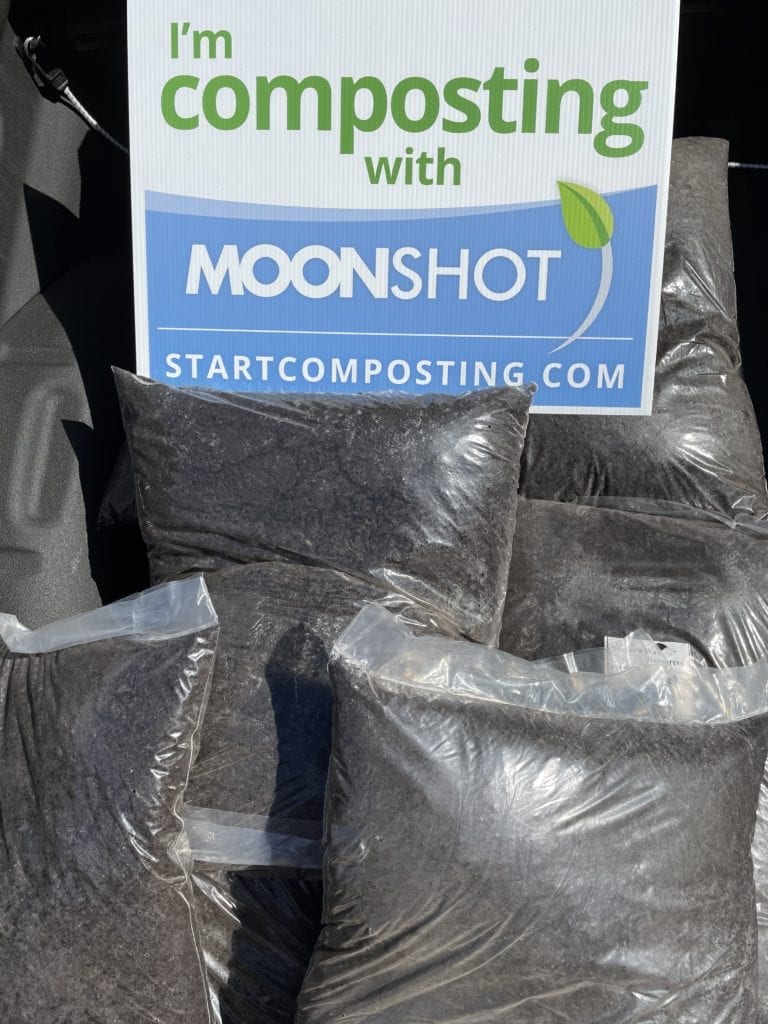Company provides services for commercial and residential clients

Moonshot Compost has established a new food waste recycling business providing services to commercial and residential clients in the Greater Houston area. The company specializes in the delivery of clean and simple methods for diverting food waste from Houston landfills by collecting and consolidating the waste for composting from local restaurants, offices, educational institutions and residences.
For commercial clients, Moonshot tailors food diversion programs around each entity’s operations. Because food waste diversion can be a new concept for many companies or institutions, the process begins with education and transitions to designing a program around diverting the easiest waste streams. More ambitious programs usually follow.
In addition to its commercial service, Moonshot offers Houston-area residents two monthly subscription programs: home curbside pick-up and flexible drop-off service at a community garden, centrally located in the Montrose area. For both options, Moonshot delivers its customers two containers for collecting food waste: a ventilated kitchen caddy and a larger, lined, airtight four-gallon bin. The kitchen caddy is easily kept close at hand in the kitchen, and its ventilated design keeps its contents fresh until they are moved to the larger airtight bin.
For pick-up customers, the larger bin is exchanged with a fresh one each week. For drop-off customers, this larger bin can be used to transport the food waste to the drop-off site.
Moonshot, which was conceived during the pandemic, is the brainchild of entrepreneurs Chris Wood and Joe Villa, who left jobs in the corporate world to start a company that could answer the question: “Why hasn’t food waste recycling happened in Houston?” With more than seven million residents and countless businesses in the Houston metropolitan area, they determined there was a viable market for composting services like other urban centers, including Seattle and Denver.
In November 2019, the partners, who are also brothers-in-law, attended a U.S. Composting Council week-long training on operating a composting facility. This intensive program gave them the tools to move forward in Houston in launching Moonshot Compost.
“Our research found that Houston businesses and residents were looking for food diversion/composting options, but there were logistical issues, such as a lack of transportation in getting the food waste from one point to another,” says Wood. “Houston is a progressive city when it comes to quality of life issues, including the environment, so we knew there was a market for our services, and we were right.”
“Our business is starting to take off with residential clients and now with an impressive list of businesses and institutions,” says Villa. “These include ConocoPhillips, Ostia, Henderson and Kane, and Annunciation Orthodox School, with Rice University and St. John’s School just added to our roster this month. We are thrilled that they have put their trust in us to handle this important operation.”
The case for diversion is straightforward. According to the U.S. Department of Agriculture, between 30 to 40 percent of the food supply is estimated to result in food waste, some of which ends up in municipal landfills. Once there, food waste decomposes to produce methane gas, which is 28 times more damaging to the atmosphere than carbon emissions. Moonshot sees these statistics as persuasive in helping Houstonians make a positive impact now and in the future.
The benefits of composting are undeniable. Deployed in the soil, compost has characteristics that make it valuable for drawing carbon dioxide from the atmosphere and for increasing water retention, which combats flooding. Compost is rich in nutrients and is used in gardens, landscaping, horticulture, urban agriculture and organic farming.
Moonshot delivers its customers’ collected food waste to local industrial compost facilities in Katy and Conroe and returns earned compost to its customers twice a year, in the fall and spring, to use as they see fit. Moonshot donates all excess compost to local community gardens.
This fall, Moonshot delivered compost to its customers and also nearly a half ton split between the Montrose Urban Food Farm and the Betty and Jacob Friedman Holistic Garden at Rice University. This way, all the valuable benefits of compost stay here in the Houston community.
Moonshot reports diversion amounts for all clients, because the company believes you cannot change what is not measured. A family of four may find that it diverts about 15 pounds of food each week on average; that equates to over 750 pounds per year. Similarly, a restaurant may divert up to 400 pounds per week; which is equal to more than 10 tons per year.
For businesses, this data can be included in sustainability reporting to various stakeholders. For residents, these statistics can be a great incentive to think differently about food purchases.
Moonshot is a member of the U.S. Composting Council, which advances compost manufacturing, compost utilization and organics recycling to benefit its members, society and the environment.
For more information about the company and its composting programs, visit either www.moonshotcompost.com or www.startcomposting.com, or call 713-955-0011. The office is located at 708 Main St. in downtown Houston.

